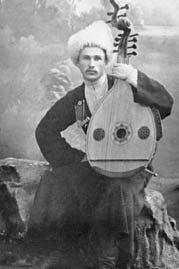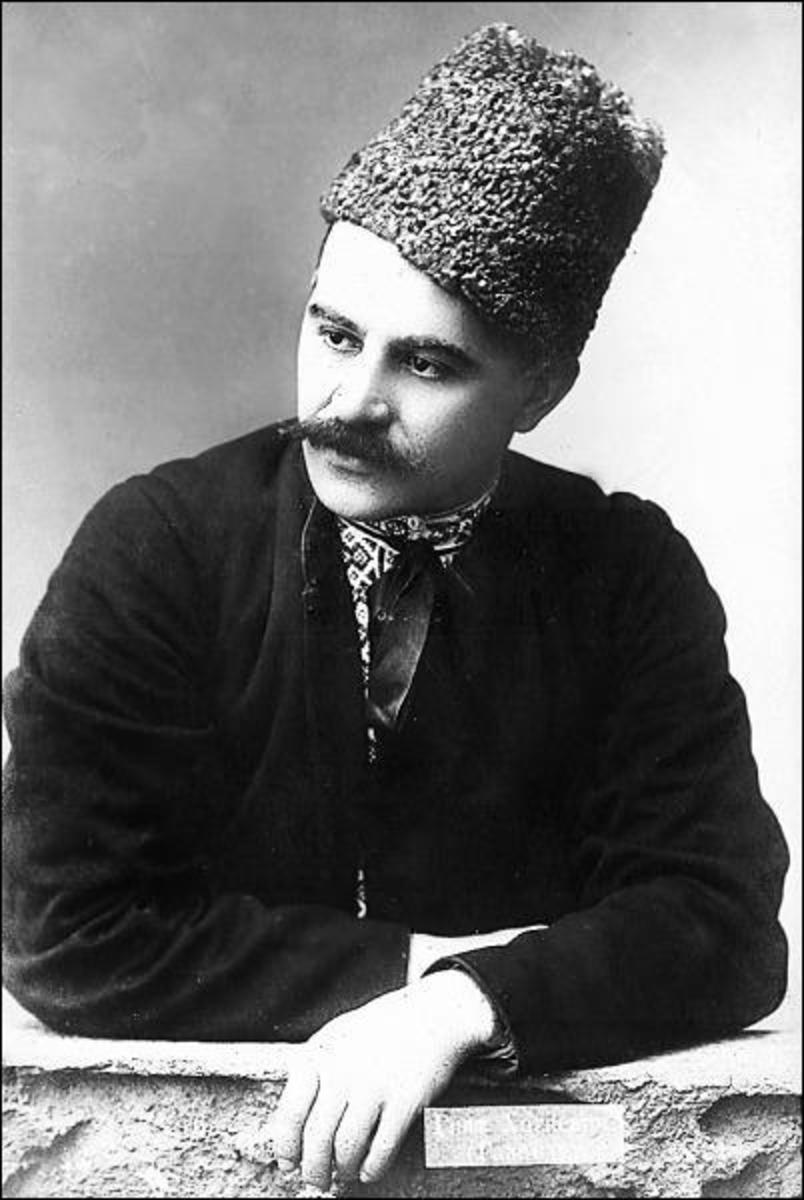|
Kuban Bandurists
A Kuban bandurists is a person who plays the Ukrainian plucked string instrument known as the bandura, who is from Kuban, a geographic region of southern Russia surrounding the Kuban River. The tradition of the kobzar in Kuban migrated from central Ukraine. According to the historian and archivist Ivan Kyiashko the Kuban Cossacks played on the kobza, violin, jaw harp, hurdy-gurdy, Bass (instrument), basses, tsymbaly, and sopilka. The Cossacks were especially respectful to itinerant blind singers who played the bandura or kobza. To them, the blind kobzar was a living reminder of their past. In previous eras they themselves were veterans of past battles and campaigns. Their repertoire retold the stories of past battles in the many epic ballads known as ''Duma (epic), dumy'' (sung epic poems). Early development The first known bandurist of the Kuban was Antin Holovaty, who because of his fine the art of playing the bandura was able to gain the territories of the Kuban for the Black ... [...More Info...] [...Related Items...] OR: [Wikipedia] [Google] [Baidu] |
Bandura
A bandura ( uk, банду́ра) is a Ukrainian plucked string folk instrument. It combines elements of the zither and lute and, up until the 1940s, was also often referred to by the term kobza. Early instruments (c. 1700) had 5 to 12 strings and similar to the lute. In the 20th century, the number of strings increased initially to 31 strings (1926), then to 56 strings – 68 strings on modern 'concert' instruments (1954).Mizynec, V. Folk Instruments of Ukraine. Bayda Books, Melbourne, Australia, 1987, 48с. Musicians who play the bandura are referred to as bandurists. In the 19th – early 20th century traditional bandura players, often blind, were referred to as kobzars. It is suggested that the instrument developed as a hybrid of gusli (Eastern-European psaltery) and kobza (Eastern-European lute). Some also consider the ''kobza'' as a type or an instrument resembling the ''bandura''. The term ''bandura'' can date itself to Polish chronicles from 1441. The hybridization, h ... [...More Info...] [...Related Items...] OR: [Wikipedia] [Google] [Baidu] |
Black Sea Cossack Host
Black Sea Cossack Host (russian: Черномо́рское каза́чье во́йско; uk, Чорномо́рське коза́цьке ві́йсько ), also known as Chernomoriya (russian: Черномо́рия), was a Cossack host of the Russian Empire created in 1787 in southern Ukraine from former Zaporozhian Cossacks.Azarenkova et al., pp. 9ff. In the 1790s, the host was re-settled to the Kuban River. It comprised the Caucasus Fortified Defence Line from the mouth of the Kuban River to the mouth of the Bolshaya Laba River. History The Black Sea host played a crucial role in the Russo-Turkish War of 1787–1797. As a result, Catherine II rewarded them with the Kuban land in the North Caucasus (north of the Kuban River, south of the Yeya River and east of the Sea of Azov) by her decree of June 30, 1792. At that time the area was inhabited by a few Nogain steppe nomads. When Russia annexed the Crimean Khanate in 1783 it inherited the Crimean claim to this ... [...More Info...] [...Related Items...] OR: [Wikipedia] [Google] [Baidu] |
Vasyl Yemetz
Vasyl' Kostovych Yemetz ( uk, Василь Костьович Ємець; 15 December or 27 December 1891 – 6 January 1982) (2 August 1890 – 4 January 1982) (also went by Wassyl, Vassyl) was born in the village of Sharivka, 40 km from Kharkiv, Ukraine. He was the son of Kost' and Yevdokia (Kurakhovych).Мішалов В. і М. — Українські кобзарі-бандуристи — Сідней, Австралія, 1986 He was married to Maria Hotra-Doroshenko. He was a virtuoso bandurist. He was founder and initial director of the Kobzar Choir in 1918 - the direct protégé of the Kiev Bandurist Capella and the Ukrainian Bandurist Chorus.Горлиця Л. — Василь Ємець — кобзар віртуоз, композитор // Вісті, № 34, 1970.Василь Ємець — творець першої української капели бандуристів, співак, бандурист, письменник http ... [...More Info...] [...Related Items...] OR: [Wikipedia] [Google] [Baidu] |
Mykola Bohuslavsky
Nikolai Alekseevich Boguslavsky ( ua, Микола Олексієвич Богуславський) (1850–1933) was an organiser and sponsor of the kobzar renaissance in the Kuban, a community leader, publisher. Bohuslavsky organized the first (1913) and second (1916) schools of kobzar art in the Kuban. Under his support bandura playing in the Kuban became a popular movement. He was an active member of the Prosvita organization in Yekaterinodar, and the owner of the Ukrainian language illustrated weekly " Dniprovi khvyli" (1910–14), which was edited by Dmytro Doroshenko. D. Doroshenko regarded Bohuslavsky as "a tireless agitator of the youth who was able to get young people involved in working on community causes." Bohuslavsky worked as an official in the Kuban-Black Sea Railway. The cossacks called him the "bandura father" because of his deep love for the instrument. As a result of his efforts bandura groups were established in most Stanitsas in the Kuban. He was arrested ... [...More Info...] [...Related Items...] OR: [Wikipedia] [Google] [Baidu] |
Hnat Khotkevych
Hnat Martynovych Khotkevych ( uk, Гнат Мартинович Хоткевич, also ''Gnat Khotkevich'' or ''Hnat Khotkevych'', born December 31, 1877 – died October 8, 1938) was a Ukrainian writer, ethnographer, playwright, composer, musicologist, and bandurist. Khotkevych was a renaissance man and was multi-talented. Although he was trained as a professional engineer, he is known more as a prolific Ukrainian literary figure, and also as a dramatist, composer and ethnographer, and father of the modern bandura. Early life and education Khotkevych was born in Kharkiv in 1877. His mother was a domestic worker, though little is known about his father, who left the family in the mid-1880s. As a youth he learned to play the piano and violin and later learned to play the bandura through observing the blind folk kobzars of the region. He completed his tertiary studies in engineering at the Kharkiv Polytechnic Institute in 1900, and then worked as a railway engineer. [...More Info...] [...Related Items...] OR: [Wikipedia] [Google] [Baidu] |
Bandurist Petro Buhay
A banduryst ( uk, бандури́ст) is a person who plays the Ukrainian plucked string instrument known as the bandura. Types of performers There are a number of different types of bandurist who differ in their particular choice of instrument, the specific repertoire they play and manner in which they approach their vocation. *Kobzari, who play authentic ethnographic instruments or copies. This group can also be further categorized into ''authentic'', ''reproduction'', and ''stage'' performers. *Academic players, playing more sophisticated contemporary concert banduras. These performers have a tertiary education majoring in bandura performance and typically perform works by Western classical composers in addition to, or instead of, Ukrainian folk music. This category can be further divided into instrumentalists (who only perform instrumental works) and vocalists (who primarily use the bandura to accompany their voice). The most common academic bandurists play in the Kiev acad ... [...More Info...] [...Related Items...] OR: [Wikipedia] [Google] [Baidu] |
Kuban 1g
Kuban (Russian and Ukrainian: Кубань; ady, Пшызэ) is a historical and geographical region of Southern Russia surrounding the Kuban River, on the Black Sea between the Don Steppe, the Volga Delta and the Caucasus, and separated from the Crimean Peninsula to the west by the Kerch Strait. Krasnodar Krai is often referred to as ''Kuban'', both officially and unofficially, although the term is not exclusive to the krai and accommodates the republics of Adygea, Karachay-Cherkessia, and parts of Stavropol Krai. Cossack settlement The Cossack settlement of Kuban and of the adjacent Black Sea region occurred gradually for over a century, and was heavily influenced by the outcomes of the conflicts between Russia and Ottoman Empire.Azarenkova et al., pp. 8ff. In the mid-18th century, the area was predominantly settled by the mountainous Adyghe tribes. After the Russo-Turkish War of 1768–1774, the population of the area started to show more pro-Russian tendencies. ... [...More Info...] [...Related Items...] OR: [Wikipedia] [Google] [Baidu] |
Ivan Zaporozhenko
Ivan () is a Slavic male given name, connected with the variant of the Greek name (English: John) from Hebrew meaning 'God is gracious'. It is associated worldwide with Slavic countries. The earliest person known to bear the name was Bulgarian tsar Ivan Vladislav. It is very popular in Russia, Ukraine, Croatia, Serbia, Bosnia and Herzegovina, Slovenia, Bulgaria, Belarus, North Macedonia, and Montenegro and has also become more popular in Romance-speaking countries since the 20th century. Etymology Ivan is the common Slavic Latin spelling, while Cyrillic spelling is two-fold: in Bulgarian, Russian, Macedonian, Serbian and Montenegrin it is Иван, while in Belarusian and Ukrainian it is Іван. The Old Church Slavonic (or Old Cyrillic) spelling is . It is the Slavic relative of the Latin name , corresponding to English ''John''. This Slavic version of the name originates from New Testament Greek (''Iōánnēs'') rather than from the Latin . The Greek name is in turn ... [...More Info...] [...Related Items...] OR: [Wikipedia] [Google] [Baidu] |
Hryhory Kozhushko
Hryhoriy ( uk, Григо́рій, Hryhórij ), sometimes Hryhory, may refer to: *Hryhory Alchevsky (1866–1920), prominent Ukrainian and minor Russian composer *Hryhoriy Baranets (born 1986), professional Ukrainian football midfielder *Hryhory Bazhul (1906–1989), Ukrainian bandurist * Hryhoriy Chernysh, candidate in the 2004 Ukrainian presidential election *Hryhoriy Chorny (died 1630), a Hetman of the Dnieper Cossacks from 1628 to 1630 * Hryhoriy Hamarnik or Grigory Gamarnik (born 1929), former Soviet world champion wrestler *Hryhoriy Hrynko (1890–1938), Soviet Ukrainian statesman who held high office in the government of the Soviet Union * Hryhoriy Hulyanytsky (died 1679), Ukrainian Cossack colonel, a skilled warrior and a shrewd politician *Hryhoriy Illyashov (born 1965), former KGB operative, Ukrainian spy, and politician * Hryhoriy Khomyshyn, Ukrainian Greek Catholic bishop and martyr * Hryhoriy Kvitka-Osnovyanenko (1778–1843), Ukrainian writer, journalist, and playwrigh ... [...More Info...] [...Related Items...] OR: [Wikipedia] [Google] [Baidu] |
.jpg)


